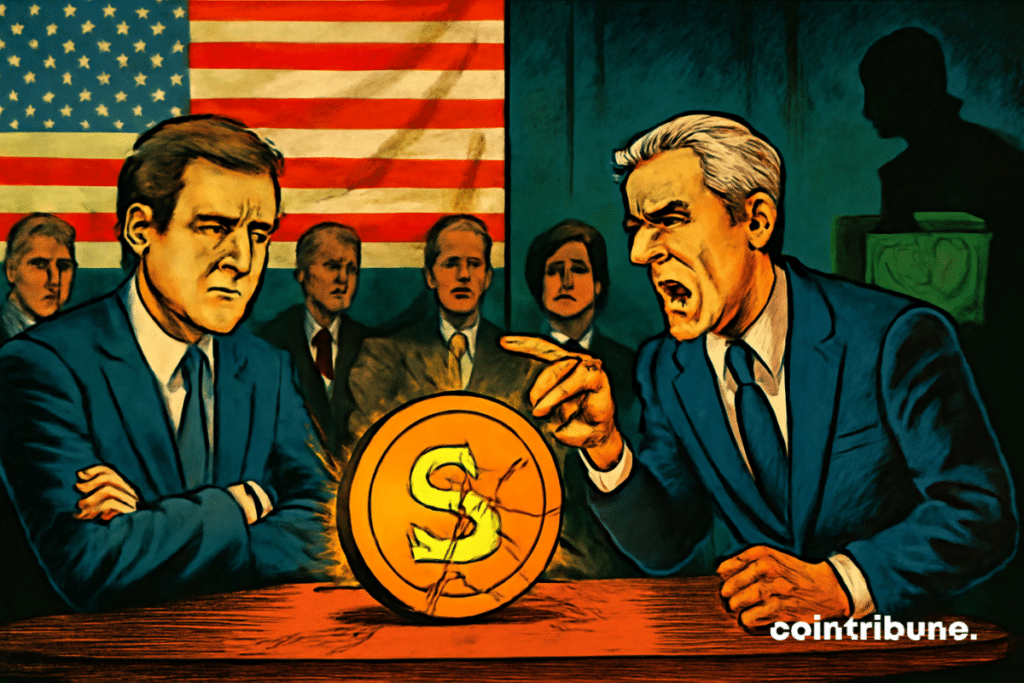Crypto: Stablecoin Vote Sparks Turmoil Within the Democratic Party
As crypto gradually redraws the lines of global financial power, the American Democratic Party is undergoing an unprecedented political storm. The Senate vote on May 19th on the GENIUS Act – a regulatory framework for stablecoins – has fractured the already fragile unity of the Democrats. By agreeing to advance the legislation, sixteen senators chose to navigate troubled waters, at the risk of fueling mistrust among their own electorate.

In Brief
- 16 Democratic senators voted in favor of the GENIUS Act on stablecoins, breaking the party’s unity and reigniting internal tensions.
- Progressive figures denounce a compromise with corruption and call to sanction pro-crypto elected officials.
- The debate on stablecoins reveals a deeper conflict between political ethics and technological adaptation within the Democratic Party.
When Crypto Fractures the American Left
The American political scene has never been kind to emerging technological subjects, but cryptos, particularly stablecoins, have a unique capacity to divide.
The Senate vote demonstrated this: a faction of the Democratic Party, until then opposed to the project due to potential implications linked to Donald Trump, abruptly changed course. A U-turn perceived as a betrayal by the grassroots base, which does not accept what it sees as a compromise with corruption.
Senator Mark Warner summarized the moderates’ argument: better an imperfect regulation than a total absence of rules. “The status quo is untenable,” he said, downplaying suspicions of abuse linked to the former president. But for figures like Elizabeth Warren, this calculation is dangerous. For her, legislating in a context of opacity is like “accelerating the train without checking if the brakes work.”
This fault line reveals a deeper malaise. Between those advocating a realistic approach to technological innovation and those who refuse to dissociate crypto from political ethics, synthesis seems increasingly illusory.
A Progressive Opposition in Search of Coherence
The shockwave of the May 19th vote extends beyond the Senate walls. Among progressives, it is time for revolt. Leading figures of Democratic activism such as Ezra Levin and Murshed Zaheed are calling to sanction the elected officials who supported the text. Their message is clear: one cannot both denounce Trump and support a legal framework that could indirectly strengthen his crypto-financial ambitions.
This divide is also generational. David Hogg, a young activist and rising figure of the progressive camp, saw his appointment canceled by the DNC leadership. A slap in the face reflecting the Democratic elites’ fear of an increasingly unruly base. The initiative “Leaders We Deserve,” which aims to renew the party’s leadership, embodies this desire for a more radical change – including on the issue of cryptos.
Progressives refuse to see crypto regulation as a mere technical matter. For them, it crystallizes a larger struggle: against deregulated capitalism where innovation serves as a pretext to evade political and fiscal responsibilities.
A fragile majority, an uncertain future
By giving in to the temptation of a compromise on stablecoins, moderate Democrats may have dug a lasting rift with their base. In the short term, the GENIUS bill is expected to be debated and potentially adopted. But at what political cost? The 2026 primaries loom, and the “16 from May 19” risk finding themselves in the activists’ crosshairs.
The irony is that stablecoins – supposed to represent stability in the crypto universe – have become the symbol of growing political instability. The Senate vote shows that the Democratic Party has still not decided between proactive regulation and ideological caution.
In short, the crypto debate is not only played out on economic or technical grounds. It reveals an existential tension within a party torn between its progressive heritage and the realities of a changing digital world. And in this political chess game, every move counts.
Crypto, long confined to the margins of political debate, is now at the heart of power struggles in Washington. The Democratic Party, torn between pragmatism and principles, could well pay a price. One thing is certain: in the digital age, ignoring crypto issues is no longer an option. The remaining question is at what cost the lack of shared vision will be paid. At JPMorgan, clients will finally be able to buy bitcoin: the bank has ultimately given its green light.
Maximize your Cointribune experience with our "Read to Earn" program! For every article you read, earn points and access exclusive rewards. Sign up now and start earning benefits.

Fascinated by Bitcoin since 2017, Evariste has continuously researched the subject. While his initial interest was in trading, he now actively seeks to understand all advances centered on cryptocurrencies. As an editor, he strives to consistently deliver high-quality work that reflects the state of the sector as a whole.
The views, thoughts, and opinions expressed in this article belong solely to the author, and should not be taken as investment advice. Do your own research before taking any investment decisions.